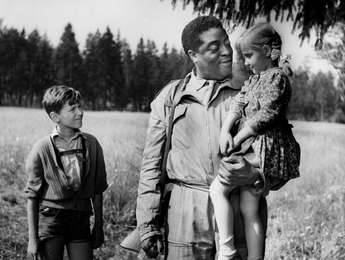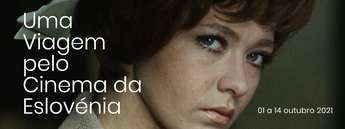The first historical retrospective of Slovenian film in Portugal
From 1 to 14 October, a retrospective of Slovenian films, shot between 1948 and 2018, will take place in the Lisbon Cinematheque in Portugal. A total of twelve Slovenian feature films – from legendary classics to more contemporary works selected by the curators of this Portuguese institution – will be screened.
France Štiglic’s Valley of Peace (1956), which was presented in the Cannes Classics programme in 2016 and subsequently screened at numerous festivals and cinematheques around the world, was selected as the opening film.
Before the screening, a reception in honour of the first historical overview of Slovenian films will be organised by the Ambassador of the Republic of Slovenia to Portugal, Ms Blažka Kepic, while Nerina T. Kocjančič from the Slovenian Film Centre will introduce the opening film.
The director France Štiglic will be presented with two additional film masterpieces: the first Slovenian full-length sound film On Our Own Land (1948) and the legendary youth film Don’t Cry, Peter (1964).
The historical retrospective will be rounded off with the works by Boštjan Hladnik, Jože Babič, Matjaž Klopčič, Karpo Godina, and France Slak. Three of these films will also be screened from 35 mm film prints, which nowadays happens almost exclusively in cinemas that are actually museums of film history.
Dance in the Rain (1961) is a Slovenian love drama directed by Boštjan Hladnik, based on Dominik Smole’s novel Črni dnevi in beli dan (Black Days and a White Day). A 35 mm copy of the work, considered the first Slovenian film noir, will be screened. Meanwhile, Don’t Come Back by the Same Way (1965), directed by Jože Babič, focuses on a group of seasonal workers from Bosnia and Herzegovina in Slovenia.
The viewers will also be able to see two films by Matjaž Klopčič: a 35 mm copy of On the Run (1967) and Funeral Feast (1969), which has already been digitally restored. On the Run is a story without a classic plot and denouement, without any drama, and virtually lacking any story. The film follows the stream of consciousness of a worker from the outskirts of the country. Funeral Feast, on the other hand, features an unforgettable masterfully-edited seven-minute shoot-out in Tivoli park, taking place in the spring of 1941, when the war brutally interferes with the lives of even the Ljubljana youth. The affairs of the heart result in a liaison with an enemy officer, while rebellion leads to organised resistance.
The Raft of Medusa (1980) by the director Karpo Godina is based on a screenplay by Branko Vučićević. The film is set in the 1920s in Vojvodina. Its protagonists are two teachers – Kristina from Slovenia and Ljiljana from Serbia. A 35 mm copy of the film, intertwined with elements of Dadaism and surrealism, will be screened.
The 1980s will also be represented by the first film by Franci Slak, The Time of Crisis (1981), which has gone down in film history as “a minimalist drama and one of the best debuts of Slovenian cinema”.
Slak’s feature will be followed by three of the more recent Slovenian films: The Family (2017) by the director Rok Biček, The Basics of Killing (2017) by Jan Cvitkovič, and History of Love (2018) by Sonja Prosenc. The observational documentary The Family won the top prize at the 70th Locarno International Film Festival in the Critics’ Week section, among others. In less than two hours, the film recounts ten years of real moments in the life of the protagonist Matej and the people around him.
In The Basics of Killing, the central plot focuses on the collapse of the idyllic relationship between parents Marko and Dunja, caused by the lack of respect due to job loss and financial ruin. In the course of the narrative, the burden that the parents can no longer bear falls increasingly on the shoulders of the children. The Basics of Killing is a story that takes place every day in Slovenia, but it could also happen anywhere else.
Meanwhile, History of Love tells the story of seventeen-year-old Iva, who faces the death of her mother. Under the impact of this profound personal loss and the discovery that she did not know everything about her mother, Iva gradually sinks into a different, almost dreamlike world, far removed from reality. The film premiered at the 53rd Karlovy Vary Film Festival in 2018 and received a Special Jury Mention for Artistic Achievement.
The retrospective was organised by the Slovenian Film Centre, the Embassy of the Republic of Slovenia in Portugal, and the Lisbon Cinematheque.

